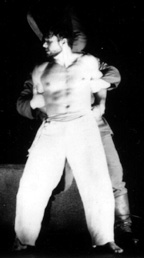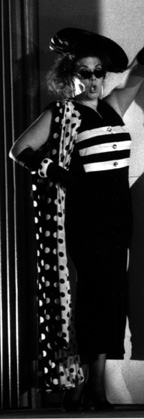|
American Gothic and Greek Revival
by Philip Anson
Splendid Summer at Glimmerglass Opera
Fully-staged opera in Montreal and Toronto
dies during the summer, which forces Canadian opera lovers to look
elsewhere for their lyric theatre fix. This can lead to some
wonderful revelations. Three years ago I made one of the most
important musical discoveries of my life at the Glimmerglass Opera
near Cooperstown in upstate New York, and subsequent seasons have
confirmed my initial enthusiasm. Here at last is opera as it should
be!
Every summer Glimmerglass offers four productions in the intimate
900-seat Alice Busch Opera Theatre. This year's operas - Madama
Butterfly, L'Italiana in Algeri, Iphigénie en Tauride and Of
Mice and Men - were stylistically balanced, provocatively staged
and brilliantly sung.
My favourite was Gluck's Iphigénie en Tauride, the great
reformer's French masterpiece. The set (the same for four acts) by
Maria Draghici was a shadowy chamber representing the temple where
Iphigénie has been ordered by the Taurian tyrant Thoas to sacrifice
all strangers to Diana. Draghici has respected as far as modernly
possible the Greek conventions of a stage (orkestra) backed
by a skene (a wall with one door for actors' entry and exit).
The set also had a few religious elements: a pool of water for
rituals of purification and sacrifice, a statue of Diana (the
goddess behind the plot) in a niche and a movable sacrificial table,
something like the ancient Greek ekkylkema.
Working within the confines of Draghici's claustrophobic space,
director Francesca Zambello gave us action resembling Greek theatre
in modern costume. Euripides was known for exploiting dramatic
entrances; Zambello has the barbaric Scythians crash through the
door dressed in the masks and combat fatigues favoured by terrorists
and SWAT teams. At other times the civilian chorus sang through a
long window at the level of the skene roof (the Glimmerglass
chorus, fortified by members of their apprenticeship program, sang
and moved irreproachably). The soloists were exemplary - in fact I
have yet to find a commercial recording that betters Glimmerglass'
Iphigénie en Tauride. Soprano Christine Goerke was every inch
Diana's reluctant priestess. Canadian soprano Isabel Bayrakdarian
lived up to expectations in her brief intervention as Diana. She is
clearly ready for bigger and better things. Tamara Hummel, another
young Canadian soprano, had a strong cameo as the Greek Woman.
Plot-wise, director Francesca Zambello sprang a controversial
surprise. Traditionally Iphigénie en Tauride is assumed to
revolve around the title character's woeful fate, but director
Zambello focussed instead on the friendship between Pylades and
Orestes. As Thoas's prisoners, Pylades and Orestes must decide which
of them will die to save the other. Zambello has gone right back to
the ancient Greek implication of friendship. By stripping Pylades
and Orestes (tenor William Burden, a fine artist, and baritone
Nathan Gunn) down to loincloths and chaining them back to back,
Zambello foregrounds what is latent in sentimental arias such as
Pylades' "Unis dès la plus tendre enfance". Once one accepts the
friends' same-sex spousal devotion, their dilemma becomes as
poignant as that of other doomed operatic couples like Madeleine and
Chénier. I had already been impressed by Nathan Gunn's splendid
baritone solo in a Mendelssohn choral work at the Lincoln Center
Festival earlier in the month. His Orestes confirmed an exceptional
talent. Gunn's recital debut at New York's Weill Recital Hall on
Feb. 20, 1998 should be a remarkable event.

Gunn
Undone
 Rossini's L'Italiana in Algeri was the summer's
biggest crowd-pleaser. The glitzy modern staging by Carol Bailey and
John Conklin and the breathless direction by Christopher Alden
guaranteed the success of this zany, action-packed spectacle. I
can't praise it more than to say that many Glimmerglass employees
went to see it repeatedly. Kevin Glavin's vocally robust and
dramatically gifted Mustafà was a pillar of the production. The
crucial tenor role of Lindoro lay a bit high for Kenneth Tarver.
Mezzo Phyllis Pancella starred as Isabella. Pancella is one of
America's most personable and gifted young mezzos. Her gamin charm
and vocal gift remind me of Cecilia Bartoli. Unfortunately I found
her less vocally robust and flexible than she was as Irene in
Glimmerglass's 1995 Tamerlano. Rossini's L'Italiana in Algeri was the summer's
biggest crowd-pleaser. The glitzy modern staging by Carol Bailey and
John Conklin and the breathless direction by Christopher Alden
guaranteed the success of this zany, action-packed spectacle. I
can't praise it more than to say that many Glimmerglass employees
went to see it repeatedly. Kevin Glavin's vocally robust and
dramatically gifted Mustafà was a pillar of the production. The
crucial tenor role of Lindoro lay a bit high for Kenneth Tarver.
Mezzo Phyllis Pancella starred as Isabella. Pancella is one of
America's most personable and gifted young mezzos. Her gamin charm
and vocal gift remind me of Cecilia Bartoli. Unfortunately I found
her less vocally robust and flexible than she was as Irene in
Glimmerglass's 1995 Tamerlano.
I hit Madama Butterfly on a bad night. Perhaps soprano
Isabelle Kabatu (Cio-Cio-San) had overtaxed herself on previous
nights, which were by all accounts remarkable. Rafael Rojas was a
better Pinkerton than many I've heard recently. Canadian soprano
Anita Krause's Suzuki had all the elements of success but her acting
could have been more nuanced. Period costumes were the best part of
this visually ravishing Butterfly.
This summer's modern offering was Carlisle Floyd's Of Mice and
Men. I didn't think that I would like this American creation but
I was pleasantly surprised. After a feeble first act it made quite
compelling theatre. Based on the tawdry and subversive Steinbeck
novel that everyone had to read in high school, Floyd's opera pulled
no punches. We were treated to a Dostoevskian picture of
Depression-era America populated by bimbos, rednecks and cretins.
The arias about the dead mouse, dead dog and dead wife were almost
redeemed from campy self-parody by Floyd's score. John Conklin's
sets, Rhoda Levine's direction and the cast's wholehearted attempt
to enter into this macabre scenario deserve high praise.
Next year's Glimmerglass season tentatively includes Handel's
Partenope with phenomenal countertenor David Daniels, Verdi's
Falstaff, Puccini's Tosca and Virgil Thomson's
Mother of Us All. Box Office: 18 Chestnut Street, Cooperstown
, N.Y. 13326. Tel. 607-547-2255. Fax: 607-547-1257. e-mail:
glimmer@magnum.wpe.com. Web: http://www.Cooperstown.net/glimmerglass .
| 

